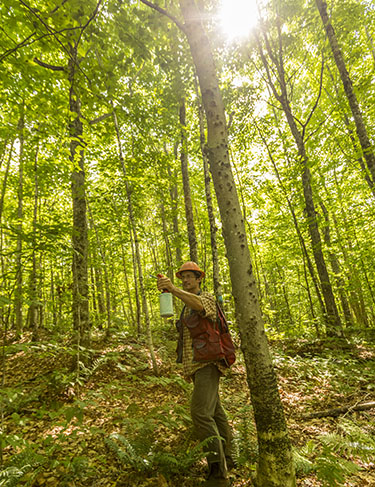Through the generous support of the Doris Duke Charitable Foundation, The Nature Conservancy’s U.S. Natural Climate Solutions Accelerator program awarded $177,000 to Manomet, Inc. to increase the climate mitigation value of commercial forest land. The grant will support Manomet’s work to increase carbon sequestration potential across 33 million acres of forestland from Maine to California.
Corporate forestland, at over 124 million acres in the United States, presents a tremendous opportunity for scaling up measures to increase natural system-based carbon sequestration and storage. “There is no more cost-effective way to prepare North American forests for climate change than to engage major timberland owners,” said Eric Walberg, Senior Program Leader, of Manomet’s Climate Services Program. “This grant from The Nature Conservancy’s U.S. Natural Climate Solutions Accelerator program supports the growth of our work to engage the timber industry to respond to the challenges of climate change.”

Manomet will partner with members of its Climate Smart Land Network (CSLN), which includes many of the major forestry companies in North America, to quantify the benefits and improve enabling conditions for the adoption of management practices with the potential to enhance climate change mitigation. Members of the CSLN learn how to put climate science into action on the ground in practical ways that make their forestland more resilient to climate impacts over the long term. CSLN members share lessons learned with network partners, enhancing each other’s ability to adapt to climate change. Over 30 million acres of private timberland are now enrolled in the CSLN.
The project will identify a range of practices that are both effective and feasible from the perspective of for-profit forestry companies. Practices to be analyzed and implemented are related to enhancing growth rates, harvest operations, silvicultural activities, extended rotation, and improved alignment of carbon market protocols with commercial operations. This vetting process will result in a framework that is applicable across all commercial forest land.
“The 2018 Fourth National Climate Assessment and Intergovernmental Panel on Climate Change’s 1.5 degrees Celsius Report are urgent wake-up calls on the need for ambitious and innovative climate action” said Catherine Macdonald, TNC’s North America Natural Climate Solutions Director. “By funding these innovative projects, we hope to kick-start promising, cost-effective nature-based climate solutions.” In addition to their climate benefits, natural climate solutions protect water supplies, improve soil health and productivity, provide wildlife habitat, buffer flood zones, and create healthier communities and increase income for private landowners.





 Back to all
Back to all
